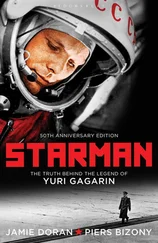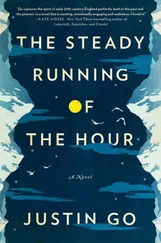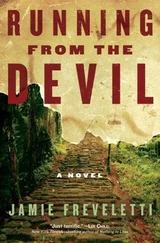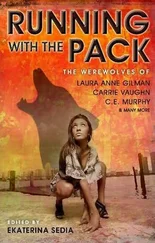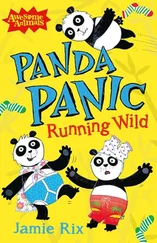Emma’s heart began to gallop, and a strange euphoria overwhelmed her. Jumbled thoughts ping-ponged through her head, ranging from crazy paranoia to calm scientific logic. Her mind screamed, Go, go! Run away! Then, Oh, God, what the hell did he inject into you? and next, Get to your hotel room and close the door—they’re coming! Somewhere in it all was another thought, born from her chemist’s experience, that calmly informed her, If it’s a chemical weapon, there’s nothing the hospital can do for you now. What sent her fear spiking was the sound of a helicopter, coming closer. Her mind flashed onto a scene from her ordeal in Colombia just a few months before. Panic gripped her.
Before she knew what she was about, she stood up and looked for her shoes.
She squinted in the sun, putting her hand to her eyes to stop the glare. The smell of burning rubber filled the air, and bits of ash blew in circular eddies, brushing across the dry, packed earth. She skirted the burning vehicle and spotted her shoes fifteen feet behind her on the side of the course. She sat down to put them on, but before she did, she took a look at her feet. They were far less enlarged. In fact, they were back to their normal, pre-race size. The effect was almost like a cartoon, where a balloon deflates with comic speed. This, the panic, and the otherworldly high told her that the medication was making a circuit through her body. She put the shoes back on with shaking hands, retied them tighter than before, reentered the path at the location where she’d been ejected, and started once again to run.
Her feet felt feather light, her heart continued to pound, but her breathing settled into a rhythm that she usually achieved at the start of a race, not at the finish. Her legs flew with renewed energy fed by a jagged anxiety. Emergency vehicles coming from the opposite direction screamed past her, not using the road where the racers were but driving in the dirt culvert on the side, kicking up clouds of dust as they did. She swept past runner after runner, catapulting herself down the path. Her head ached with the precursor of a headache, but the pain was nothing compared to the exhilaration she felt since being stuck with the pen. She moved faster and faster, reaching per-mile speeds that were a personal best for her this late in the game, yet still she felt no real strain from the blistering pace.
She blew past the other competitors, all of whom were showing the extreme fatigue that was common in the last few miles of an ultra and for some was magnified by the pace they drove themselves to maintain since coming upon the burning vehicle. Some stopped to throw up on the shoulder of the road as their stomachs rejected the combination of runner’s gel and liquids that constituted the whole of their sustenance, while others subsided to a dejected walk, their bodies curving from the waist up like a question mark, the result of their muscles’ weakening strength. Some fell on the side of the path and lay there, taking shallow breaths. For them the race was over. This was what the Comrades could do to a runner.
Half an hour later, Emma still ran at breakneck speeds. Several police vans drove up next to the course, heading in the same direction as the runners. One pulled parallel to Emma, and she watched as a race official leaned out of the back window. He placed a bullhorn to his lips.
“Keep going straight! Do not deviate from the path for any reason. Avoid all cars parked on the roadside. Emergency personnel are assembled at the finish, and fire-department crews are checking every vehicle for suspicious cargo. Any runners who wish to stop should step to the side and wait. A rescue bus has been dispatched that can drive you to a safe location.”
I’ll be damned if I’ll stop, Emma thought. Rather than calming her, the sight of the officials elicited a paranoiac’s reaction. Emma wanted to get away from the truck. It took all her willpower to stay on the course and allow it to pace her. She kicked up her speed, running faster.
Two and a half hours later, she crossed the finish line. Her legs still felt powerful, but the paranoia had decreased to manageable levels. Along with the receding terror came the return of rational thinking. Now a secondary type of fear gripped her, because she realized that she should have left the course two hours earlier and headed straight to a hospital for testing. The risk she’d taken in waiting was astronomical. Even so, she realized that whatever had been pumped into her was clearly not designed to kill her immediately. In fact, she had never felt stronger at the end of an ultra than she did at that moment.
Ambulances lined the corral set up to cordon off the finishers from spectators. Runners milled around, some shaking, others crying, and the rest standing in numb silence. Media trucks, their roofs covered with satellite dishes and bristling with antennas, were parked in a crazy-quilt fashion on the outside of the gated area. The reporters leaned over the temporary fence, holding their microphones aloft as they attempted to interview the runners. Paramedics worked on several people who had collapsed, from either the heat or fear, or both.
The Comrades maintained a fully functional mobile ICU manned by doctors and nurses and prepared to assist any runners who fell into distress during the competition. A quick glance told Emma that she would not get anywhere near it in the time she needed to. At least fifty stretchers containing downed runners lay in a widening circle around it, while triage nurses worked through the injured.
Emma handed her timing chip to the attendant waiting to accept them, veered away from the ICU, and headed to the tent erected by Price Pharmaceuticals, a client of hers and the entity charged with post-race drug testing. She walked with a grim determination. She needed to know what had been pumped into her, and she needed to know it fast. Who better to check for a performance-enhancing drug or an illegal substance than the drug testers themselves?
A young woman guarded the door to the VIP area. Emma flashed the red wristband that showed she was a Price-sponsored athlete and stepped inside. Tables set up at the back held large water bottles, bowls of fruit, bagels, and a caterer’s carafe of coffee and tea. Nurses staffed a makeshift lab in the right corner. One, named Karen Stringer, spotted Emma. She closed her eyes briefly, as if in relief, and hurried over. Karen and Emma knew each other from the work that Emma’s company, Pure Chemistry, did for Price. When she reached Emma, Karen threw her arms around her.
“Thank God you’re all right! We’ve been wrecks around here since hearing the news of the bombing.” Karen pulled away to take a look at Emma. Before she could speak, Emma interrupted her.
“I know. I’m a mess. I was near the car when it exploded.” Emma displayed the road rash on her leg. “Compliments of flying into the dirt. Can I get it cleaned and a bandage? And if I give you a urine sample, can you test it for any banned substances? I need a drug test right away.”
Karen frowned at her. “Actually, you look better than anyone I’ve seen so far, even the winners. You’re not limping? I swear you’re the only one. We’ve had a wave of injuries, heat prostration, and dehydration. And why in the world do you need a drug test? We only test the medalists.”
Emma took a deep breath. “The bomb blew me off the path. While I lay there, a man walked up to me and injected me with something.”
Karen’s face took on a horrified expression. “Injected you? That’s awful! Forget the drug testing, you need to go to ICU or the hospital right now.”
“No! That won’t work. People are lined up ten deep in front of the ICU, and the local hospital will take hours, probably even days, to obtain lab results—and that’s assuming they even have the necessary equipment.” Emma waved a hand at the nurses’ station. “You can test me right here, use Rapidtest.”
Читать дальше

